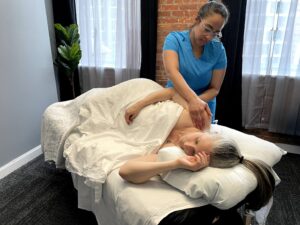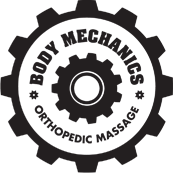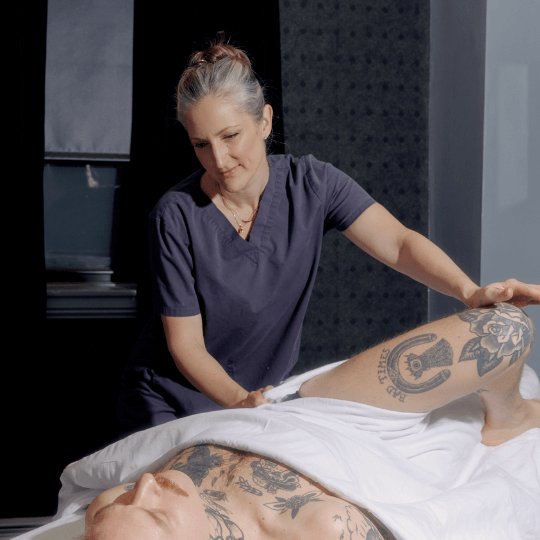Massage in the First Trimester of Pregnancy
You might be reading this blog because you’re pregnant or you might be reading this blog because you have questions about being pregnant and receiving massage therapy. It’s natural to have reservations when contemplating a massage during the first trimester. After all, you want to prioritize the health and well-being of both yourself and your unborn child. We hope that this article will help alivate some of your stress in understanding your choices.
A quick Google will show you lots of articles telling you a very broad range of things: what is real and what isn’t can be very confusing, especially for a lay person. There is a lot of misinformation on the web. This article seeks to help you understand the benefits, risks, side effects and truths about having a massage in your first trimester.

The First Trimester of Pregnancy: Lots of changes and emotions!
First, let’s talk about the first trimester in general. The first trimester is generally understood to be the first one to 12 weeks of pregnancy. It’s during this time your body. During this time, the woman’s body is preparing to accommodate the new cells that will soon turn into a baby growing within her womb for many women. This period of time could be scary exciting and even make them feel sick.
Common first-trimester symptoms are morning sickness, fatigue, rest tenderness from hormone changes, height, sensitivities to smell, stress, anxiety, and a host of other symptoms that are individual to each woman.
Why would a woman want a prenatal massage in their first trimester?
Well, every woman is different. Because they are undergoing changes. Many women are uncomfortable, and so seek out touch or massage as a way to self-soothe.
Many women during the first trimester of pregnancy are also interested in ” optimizing their health, “improving self-care and wellness practices in hopes that this will positively affect the baby.
Some women might already actively engage in massage therapy and be looking to continue their regularly planned life with his little interruption as possible,. And then for others, they may have also been recommended to massage by a healthcare professional looking to help them manage an ongoing personal issue through massage therapy as a medication free intervention during their pregnancy. There are a lot of reasons why a woman might seek out massage therapy in her first trimester.
Concerns and Considerations about Pregnancy Massage Early On
It’s natural to have reservations when contemplating a massage during the first trimester. After all, you want to prioritize the health and well-being of both yourself and your unborn child. Unfortunately, it’s hard to know what is right because there is so much information out there, much of which is opinion-based and not based on reality. Some common concerns include:
- Risk of Miscarriage: Many women worry that the pressure applied during a massage could trigger a miscarriage, particularly in the delicate early stages of pregnancy. (Spoiler alert! Research shows this not to be true)
- Safety of Lotions: Massage lotions may have unknown ingredients, such as parabins, to stabilize them. The skin is the largest organ in your body and people would have concerns about applying lotion to their body with unknown ingredients. (You can totally not use these! Know your rights)
- Unknown Health Effects: The thought of the unknown itself could be scary to somebody. Without knowing how massage works exactly or how a pregnancy might be affected, a person could have concerns about how massage might affect the pregnancy.
Addressing Concerns and Sorting Out fact from Fiction in Prenatal Massage
- Risk of miscarriage: There are currently no known studies linking miscarriage to massage. From a research perspective, there is no correlation. That doesn’t mean you still couldn’t be injured through massage, but having a massage itself is unlikely to cause a miscarriage. “physiological mechanisms regulating pregnancy and known risk factors associated with miscarriage provide no evidence that massage in pregnancy would increase a patient’s risk of miscarriage.”
- Safety of lotions and chemicals: Choosing what you put on your body is a form of consent. It is reasonable to assume that in pregnancy, you should be extra careful with what you ingest as well as put on your skin. Asking questions about what lotion is going to be used and what is provided can help your concerns. If you don’t want to use it, the lotion provided in many places will let you bring your own. Our office uses an all-natural paraben-free JoJoba oil for its pregnancy massages to mitigate these concerns. Jojoba oil closely resembles the skin’s natural sebum.
- Unknown effects: It is true we can’t always know the outcome of things, but since there is no correlation between massage and miscarriage, if you don’t have underlying health conditions or reason that massage should be contraindicated otherwise, massage should be fit safe for you to receive. If you’re not comfortable, however, don’t have it.
About those pesky pressure points that you’re not supposed to touch? Does that Affect my Pregnancy?
There is the science of massage and the tradition of massage. Those two things are interrelated but separate. In the Eastern tradition of massage, which is acupuncture and acupressure, there are points on the body that are not supposed to be manipulated, such as around the ankles. However, massage therapy is not acupressure. You’re not holding things for a long extended period of time, and this is a tradition, not a science or scientific perspective; pressing certain points in your body will not cause problems if there is any evidence to support p pressure points, causing labor. There would be an acupressurist in the average delivery room. In fact, when studies have been done on this, it show no risk of negative outcomes for stimulating these points during pregnancy. The truth is pregnancy massage is typically a very safe activity for most women so long as they have consulted with their obgyn about extenuating health care issues.
Why Some Places Don’t Allow Pregnancy Massage in the First Trimester
Despite the potential benefits, some spas and massage centers have policies against offering massages to women in their first trimester. This policy helps reinforce the myths around massaging the first trimester by making people think that they shouldn’t be coming in because there is a risk of miscarriage. Unfortunately, that isn’t true, but there is a liability risk. Miscarriages are most common in the first trimester, with “43% of women reported having had 1 or more first-trimester spontaneous miscarriages.” Not allowing first-trimester women to receive massages is more likely a policy about the concern of being guilty by proximity. When we googled this to try to find a source, we could not find one; no one is actively advertising their discrimination. We know it is happening, however, as we are frequently called about it by women who were denied treatment at other facilities and we have staff who have worked at those facilities.
“Approximately 50% of first trimester miscarriages are due to a chromosome abnormality in the fetus.” There are a number of other reasons that a woman could miscarry in their first trimester or later as well such as a blood type issue, clotting disorders, or other biological complications. We should not give massage therapists magic powers if a woman is up and walking around and exercising and doing all of her daily activities and her doctor approves, she’s likely a good candidate for massage.
What can I do to make my massage experience as safe as possible?
1. Choose a licensed massage therapist: there’s a time in a place for getting a good rub. Not all people who provide hands-on services are licensed. If you have concerns about your pregnancy, your best option is to find a licensed and trained massage. Therapists who are experienced in prenatal massage: All of the therapists that we employ are licensed and trained. And have had extensive advanced training through additional classes as well as training with our on-site training programs.
2.Ask a lot of questions: Asking a lot of questions about your provider, the environment, and what kind of products that they can are using can be really helpful and soothing your fears as well as protecting yourself. If you don’t like the product that somebody is using provide your own or find another therapist. A good rule of thumb is “know before you go” so your not put on the spot and subject to choices you might otherwise not make.
3. Talk to your doctor: It can be really helpful to sit down with your doctor and ask if you have any extenuating circumstances that might make you a great candidate for certain exercise programs or other kinds of lifestyle choices. Knowledge is power if you’re not a candidate for massage now you may be a candidate for massage later in your pregnancy.
4. Know your rights: You have the right to a safe, consensual massage. That means at any point in the treatment if you change your mind, you can stop it or change it. Knowing that you have the right to stop, change, or modify any of the things that are happening to your body is really important, and keeping you safe, even if you just don’t like the temperature in the room, speak up; it can be changed.
5. Know that you can be positioned in ways that make you comfortable and safe: Prenatal massage often comes with a lot of props and pillows. If you’re not comfortable, we can adjust you to a different position. Prenatal massages can be done in a wide variety of positions that make you feel safe, healthy, and comfortable knowing that you can change position is really helpful and having a great prenatal massage experience.
In Conclusion
In the end, the decision to have a massage during the first trimester of pregnancy is a personal one that should be made in consultation with your healthcare provider. Many expectant mothers find that massage can be a safe and beneficial way to alleviate the physical and emotional stresses of early pregnancy. Remember, your well-being is paramount, so trust your instincts and prioritize self-care as you embark on this incredible journey of motherhood.
If you are looking for safe, effective prenatal massage from a licensed practitioner, you can book with us! Our prenatal massages in NYC can be done on our special face-down massage tables, or they can be done in a side-lying position. Each one of our therapists is licensed and insured in the state of New York. Take a peek at our staff here.

